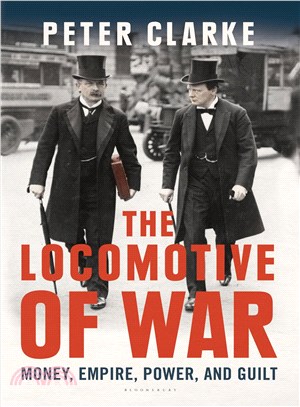目前查詢
歷史查詢

The locomotive of war :money, empire, power, and guilt /
- 館藏(1)
- 書目資訊
- 心得(0)
- 機讀格式
- 標籤
書名 : The locomotive of war :money, empire, power, and guilt /
紀錄類型 : 書目-語言資料,印刷品: 單行本
正題名[資料類型標示]/作者 : The locomotive of war :Peter Clarke.
其他題名 : money, empire, power, and guilt /
其他題名 : Money, empire, power, and guilt.
作者 : Clarke, P. F.
出版者 : New York :Bloomsbury Press,2017.
面頁冊數 : ix, 418 pages :illustrations, map ;24 cm.
內容註 : "'War is the locomotive of history,' claimed Trotsky, a remark thought to acknowledge the opportunity the First World War offered the Bolsheviks to seize power in Russia 1917. And here Peter Clarke uses it on a broader canvas to explore how war, rather than socioeconomic forces or individuals, is the prime mover of history. Twentieth-century warfare, based on new technologies and mass armies, saw the locomotive power of war geared up to an unprecedented level, and through the unique prism of this vast tragedy Peter Clarke examines the most influential figures of the day: David Lloyd George who, without the strains of war, would never have become prime minister in 1916; Winston Churchill who, except for the war crisis of 1940, would have been unlikely to be recalled to office; and John Maynard Keynes who, but for the same, would hardly have seen his own economic ideas and authority so suddenly accepted. Gladstone, Woodrow Wilson, Asquith, Roosevelt, they're all here in this highly sophisticated analysis of the lives, writings, decisions and pronouncements of the era's leaders. By following the trajectories of these influential lives Peter Clarke illuminates some of the crucial issues of the period: not only leadership and the projection of authority but also military strategy, war finance and the mobilization of the nation's personnel and economic resources. The Locomotive of War is a fascinating examination of the interplay between key figures in the context of unprecedented all-out war of 1914 and 1939 and the broader dynamics of history in an extraordinary period"--Publisher's description.
標題 : World War, 1914-1918
ISBN : 9781620406601 (hbk.) :
LEADER 02053pam 2200133 a 4500
001 942415
005 20190426092822.0
008 190514s2017 nyua g 000 0 eng d
020 $a9781620406601 (hbk.) :$cNT$1050
082 04$a940.31$222
100 1 $aClarke, P. F.
245 10$aThe locomotive of war :$bmoney, empire, power, and guilt /$cPeter Clarke.
246 30$aMoney, empire, power, and guilt.
260 $aNew York :$bBloomsbury Press,$c2017.
300 $aix, 418 pages :$billustrations, map ;$c24 cm.
505 0 $a"'War is the locomotive of history,' claimed Trotsky, a remark thought to acknowledge the opportunity the First World War offered the Bolsheviks to seize power in Russia 1917. And here Peter Clarke uses it on a broader canvas to explore how war, rather than socioeconomic forces or individuals, is the prime mover of history. Twentieth-century warfare, based on new technologies and mass armies, saw the locomotive power of war geared up to an unprecedented level, and through the unique prism of this vast tragedy Peter Clarke examines the most influential figures of the day: David Lloyd George who, without the strains of war, would never have become prime minister in 1916; Winston Churchill who, except for the war crisis of 1940, would have been unlikely to be recalled to office; and John Maynard Keynes who, but for the same, would hardly have seen his own economic ideas and authority so suddenly accepted. Gladstone, Woodrow Wilson, Asquith, Roosevelt, they're all here in this highly sophisticated analysis of the lives, writings, decisions and pronouncements of the era's leaders. By following the trajectories of these influential lives Peter Clarke illuminates some of the crucial issues of the period: not only leadership and the projection of authority but also military strategy, war finance and the mobilization of the nation's personnel and economic resources. The Locomotive of War is a fascinating examination of the interplay between key figures in the context of unprecedented all-out war of 1914 and 1939 and the broader dynamics of history in an extraordinary period"--Publisher's description.
650 0$aWorld War, 1914-1918$xInfluence.
650 0$aLiberalism$vPhilosophy$vHistory$y20th century.
650 0$aWorld War, 1914-1918$xCauses.
650 0$aHistory, Modern$y20th century.
